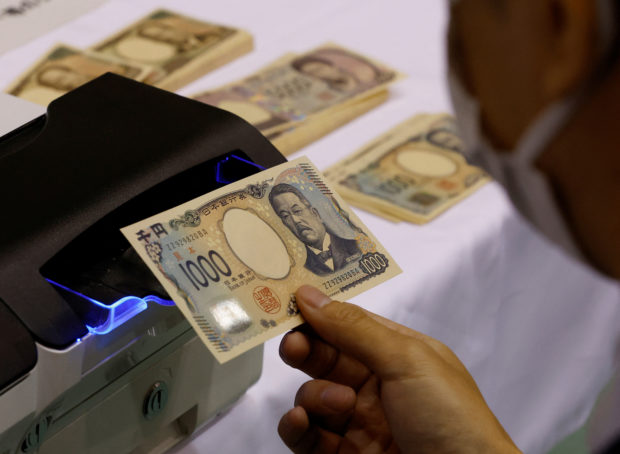Investors revive wagers on Bank of Japan policy change

A worker holds a sample of a new Japanese yen banknote at a factory of the National Printing Bureau producing Bank of Japan. They were presented at a media event on Nov 21, 2022. The new notes are scheduled to be introduced in 2024. REUTERS/Kim Kyung-Hoon
TOKYO – Global investors are short-selling Japanese bonds and driving its other market yields higher, reviving bets that the Bank of Japan will need to tweak its ultra-easy monetary policy sooner rather than later.
The wagers have perked up after data late last month showed consumer prices in Tokyo rose at their fastest annual pace in 40 years in November, suggesting the BOJ might be closer to achieving its policy intent of sustained 2 percent inflation.
“With prices rising, speculation that the Bank of Japan may change its yield curve control is getting stronger than before,” said Masayuki Koguchi, general manager at the fixed income investment division of Mitsubishi UFJ Kokusai Asset Management.
The bets have kept yields on benchmark 10-year bonds at 0.25mpercent — the top end of the BOJ’s target band — for days, even as the central bank continues to offer to buy unlimited amounts of bonds with that maturity. Front-end swaps show 3-month rates turning positive by February.
BOJ Governor Haruhiko Kuroda has repeatedly stressed the need to persist with the bank’s unique yield-curve-control policy, which makes Japan an outlier among major central banks aggressively tightening policy to combat inflation.
Under its yield curve control (YCC), the BOJ guides short-term interest rates at -0.1 percent and pledges to guide the 10-year bond yield around 0 percent with an implicit 0.25 percent cap.
“The focus just on the 10-year yield and YCC is a bit weird because the rest of the rates market has already completely moved on from YCC,” said UBS’s London-based strategist James Malcolm, pointing to how 10-year swaps used to straddle the JGB yield until early this year and are now more than double the value at 63 basis points (bps).
Kuroda has said policy will not change until the recent cost-push inflation is accompanied by higher growth in wages. That, and a suspicion Kuroda will avoid making changes in the final months of his term that ends in early April, has derailed investors betting on a change several times this year.
“Short positions on JGBs have not been covered yet,” said Ataru Okumura, a strategist at SMBC Nikko Securities.
Foreigners have sold 1.1 trillion yen ($8.02 billion) of JGBs in the week ended Dec. 3, which followed 45.1 billion yen of selling in the previous week.
Wage talks
The divergence between the BOJ’s dovish stance and the U.S. Federal Reserve’s aggressive rate hikes had pushed the yen to 32-year lows in October.
“The central bank may tweak its YCC before March. The decision could be made after the ‘shunto’, but the BOJ may not have to wait for that,” said Ayako Fujita, chief Japan economist at JPMorgan Securities.
The “shunto” spring wage talks happen every March, when Japan’s blue-chip firms meet with unions to discuss employees’ pay in the next fiscal year.
A known BOJ dove and board member Asahi Noguchi said last week the central bank could “pre-emptively” withdraw monetary stimulus if trend inflation, which takes into account wage and services prices, overshoots expectations and stays above its 2 percent target.
Traders also pointed to remarks from Naoki Tamura, a new BOJ board member, saying the Bank should examine the pros and cons of yield curve control and that the policy had caused market mispricing, as the latest reason for the speculation.
The BOJ could raise its target for 10-year yield from 0 to 25 bps, or widen the trading band by 25 bps to 0.50 percent on either side, said Fujita.
The BOJ’s next policy meetings are on Dec. 19-20, and then on Jan. 17-18.
Kuroda’s recent speeches on the framework for exiting easy monetary conditions have been centred around short-term rates and the BOJ’s burgeoning balance sheet, giving speculators further reason to believe he is no longer wedded to YCC per se.
“My personal view is that the January meeting is quite live because it’s Mr. Kuroda’s last outlook meeting. There should be an event weight it doesn’t have at the moment,” says Malcolm, while making clear UBS does not expect any policy change for at least another year.
($1 = 137.0900 yen)
READ:
Japan’s inflation hits 40-year high as weak yen fans import costs